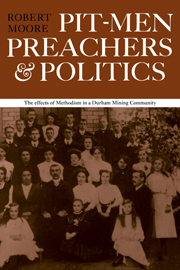Book contents
- Frontmatter
- Contents
- Dedication
- Acknowledgements
- List of abbreviations
- Introduction
- 1 Historical background
- 2 The Deerness Valley
- 3 The social and economic basis of paternalism: the colliery-owners in the Deerness Valley
- 4 Village Methodism – I
- 5 Village Methodism – II: the structure of the Methodist societies in the Deerness Valley
- 6 The respectable Methodists and the old Liberalism
- 7 The radicals and the Labour Movement, 1900–1926
- 8 Methodists in action: three political case studies
- 9 1970 – a postscript
- Conclusions
- Appendix I research strategy and techniques
- Appendix II the Methodist community and objections to Anglican union
- Appendix III the religious statistics
- Appendix IV occupational status, social mobility and the structure of Methodist leadership
- Notes
- Bibliography
- Glossary
- Index
7 - The radicals and the Labour Movement, 1900–1926
Published online by Cambridge University Press: 24 November 2009
- Frontmatter
- Contents
- Dedication
- Acknowledgements
- List of abbreviations
- Introduction
- 1 Historical background
- 2 The Deerness Valley
- 3 The social and economic basis of paternalism: the colliery-owners in the Deerness Valley
- 4 Village Methodism – I
- 5 Village Methodism – II: the structure of the Methodist societies in the Deerness Valley
- 6 The respectable Methodists and the old Liberalism
- 7 The radicals and the Labour Movement, 1900–1926
- 8 Methodists in action: three political case studies
- 9 1970 – a postscript
- Conclusions
- Appendix I research strategy and techniques
- Appendix II the Methodist community and objections to Anglican union
- Appendix III the religious statistics
- Appendix IV occupational status, social mobility and the structure of Methodist leadership
- Notes
- Bibliography
- Glossary
- Index
Summary
The Durham miners were, in Gregory's terms, amongst the ‘frontrunnners’ in the development of the Labour vote in British mining. Given that Methodism was such a strong integrating force in the Liberal establishment at local and regional level, the obvious question is how much Methodism still inhibited the mobilisation of the Labour vote, and the development of class consciousness.
There is the whole class of older Methodists, staunch Liberals, to whom community loyalties were fundamental. The first priority will be to investigate the others who deserted, who they were, where they came from, how radical the switch to Labour affiliation really was, whether they still accommodated their Methodist principles, and if so how.
THE RADICALS
The earliest record of radical non-Liberal political activity is found in Joseph Taylor's diaries for 1895 and 1896. In May 1895 Ed. Cooke read a paper to the Hamsteels Bible class, entitled ‘The Independent Labour Party’. In August he read another ‘The Defeat of the Liberal Party’. A year later Richard Burleigh, school attendance officer and local preacher (see Glossary) read a paper on ‘Christian Socialism’. In November 1896 a visiting preacher spoke on a week-night to the subject ‘Monopolists or the Multitudes, Which?’ The full membership of this Bible class is unrecorded but among its active members were: John Harrison, Ed. Cooke, and T. Gott. John Harrison was a miner and P.M. local preacher.
- Type
- Chapter
- Information
- Pitmen Preachers and Politics , pp. 169 - 190Publisher: Cambridge University PressPrint publication year: 1974
- 1
- Cited by



